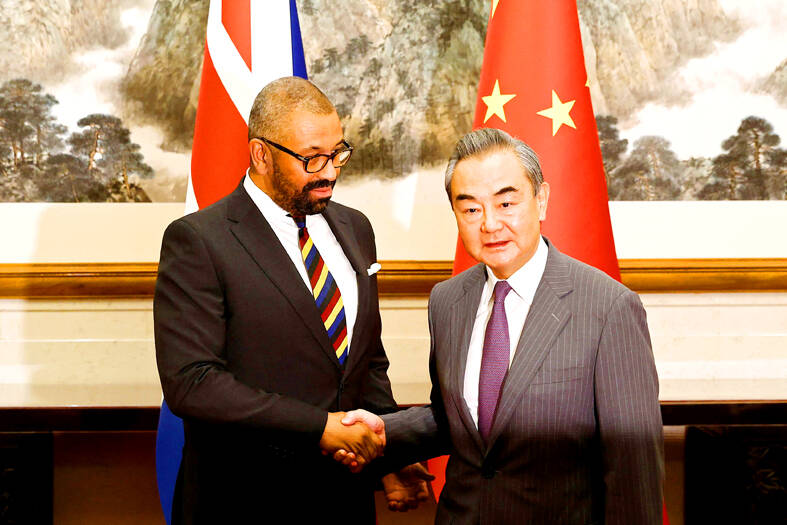The Ministry of Foreign Affairs yesterday thanked the British parliament for showing concern over the increasing threat to regional peace emanating from China after a report by British lawmakers described Taiwan as “an independent country” for the first time.
Taiwan “sincerely welcomes” the concern the British parliament displayed for the situation in the Indo-Pacific region and China’s threats, the ministry said in a news release.
The nation views the UK as a like-minded partner, and is eager to boost bilateral ties in trade and investment, cooperation in the semiconductor industry and information technology, offshore wind power and other areas, it said.

Photo: AFP
Published by the British House of Commons Foreign Affairs Committee concurrently with British Secretary of State for Foreign, Commonwealth and Development Affairs James Cleverly’s visit to Beijing, the report on Britain’s so-called “Indo-Pacific tilt” said that Taiwan “is already an independent country under the name Republic of China.”
“Taiwan possesses all the qualifications for statehood, including a permanent population, a defined territory, government and the capacity to enter into relations with other states — it is only lacking greater international recognition,” the report said.
China poses “a threat to the UK and its interests,” it said. “The behavior of the Chinese Communist Party is currently characterized by increased aggression” to Britain.
The document also criticized British Prime Minister Rishi Sunak’s approach to China saying: “There is confusion in Whitehall about the tilt to the Indo-Pacific, stemming from a failure to explain the policy, and its implications for resource allocation, across government.”
The report urged London to develop “deterrence diplomacy,” increase resilience and defense cooperation with allies, counter Beijing’s threats and protect “the self-determination of the people of Taiwan.”
Cleverly told Bloomberg in an interview that the report was “not a UK government document” and added that London’s stance “has remained consistent that there should be no unilateral change to the status quo.”
“Any changes should be done through discussions on both sides of the Taiwan Strait,” he said.
British Member of Parliament Alicia Kearnes, who is chair of the committee, told Agence France-Presse that “we acknowledge China’s position, but we as [the foreign affairs committee] do not accept it.”
“Strengthening our diplomatic, defensive and economic ties in the Indo-Pacific is critical — if the West leaves a vacuum, China will eagerly fill it,” Kearnes said.
London should announce a policy of “zero tolerance of transnational repression,” including expelling foreign diplomats who intimidate or attack British citizens or those given refuge in the UK, she added.

SECURITY: As China is ‘reshaping’ Hong Kong’s population, Taiwan must raise the eligibility threshold for applications from Hong Kongers, Chiu Chui-cheng said When Hong Kong and Macau citizens apply for residency in Taiwan, it would be under a new category that includes a “national security observation period,” Mainland Affairs Council (MAC) Minister Chiu Chui-cheng (邱垂正) said yesterday. President William Lai (賴清德) on March 13 announced 17 strategies to counter China’s aggression toward Taiwan, including incorporating national security considerations into the review process for residency applications from Hong Kong and Macau citizens. The situation in Hong Kong is constantly changing, Chiu said to media yesterday on the sidelines of the Taipei Technology Run hosted by the Taipei Neihu Technology Park Development Association. With

A US Marine Corps regiment equipped with Naval Strike Missiles (NSM) is set to participate in the upcoming Balikatan 25 exercise in the Luzon Strait, marking the system’s first-ever deployment in the Philippines. US and Philippine officials have separately confirmed that the Navy Marine Expeditionary Ship Interdiction System (NMESIS) — the mobile launch platform for the Naval Strike Missile — would take part in the joint exercise. The missiles are being deployed to “a strategic first island chain chokepoint” in the waters between Taiwan proper and the Philippines, US-based Naval News reported. “The Luzon Strait and Bashi Channel represent a critical access

‘FORM OF PROTEST’: The German Institute Taipei said it was ‘shocked’ to see Nazi symbolism used in connection with political aims as it condemned the incident Sung Chien-liang (宋建樑), who led efforts to recall Democratic Progressive Party (DPP) Legislator Lee Kun-cheng (李坤城), was released on bail of NT$80,000 yesterday amid an outcry over a Nazi armband he wore to questioning the night before. Sung arrived at the New Taipei City District Prosecutors’ Office for questioning in a recall petition forgery case on Tuesday night wearing a red armband bearing a swastika, carrying a copy of Adolf Hitler’s Mein Kampf and giving a Nazi salute. Sung left the building at 1:15am without the armband and apparently covering the book with a coat. This is a serious international scandal and Chinese

COUNTERINTELLIGENCE TRAINING: The ministry said 87.5 percent of the apprehended Chinese agents were reported by service members they tried to lure into becoming spies Taiwanese organized crime, illegal money lenders, temples and civic groups are complicit in Beijing’s infiltration of the armed forces, the Ministry of National Defense (MND) said in a report yesterday. Retired service members who had been turned to Beijing’s cause mainly relied on those channels to infiltrate the Taiwanese military, according to the report to be submitted to lawmakers ahead of tomorrow’s hearing on Chinese espionage in the military. Chinese intelligence typically used blackmail, Internet-based communications, bribery or debts to loan sharks to leverage active service personnel to do its bidding, it said. China’s main goals are to collect intelligence, and develop a